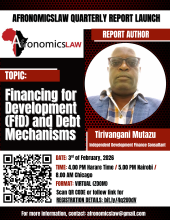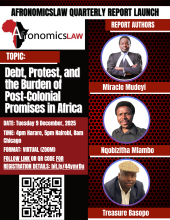Afronomicslaw Quarterly Report Launch: Financing for Development (FfD) and Debt Mechanisms
Using the dependency theory and a political economy framework to analyze the FfD4 Outcome Document, this paper provides a brief critical review of the ineffectiveness of debt restructuring initiatives over the past decade (2015–2025). The paper shows how dire the debt crisis has been and continues to be, and how Seville was a missed opportunity to change course. Importantly, it critically analyzes what Seville managed “to do and did not do” on debt and international financial architecture provisions in the Outcome Document and concludes by providing recommendations to strengthen them in a post-Seville.

